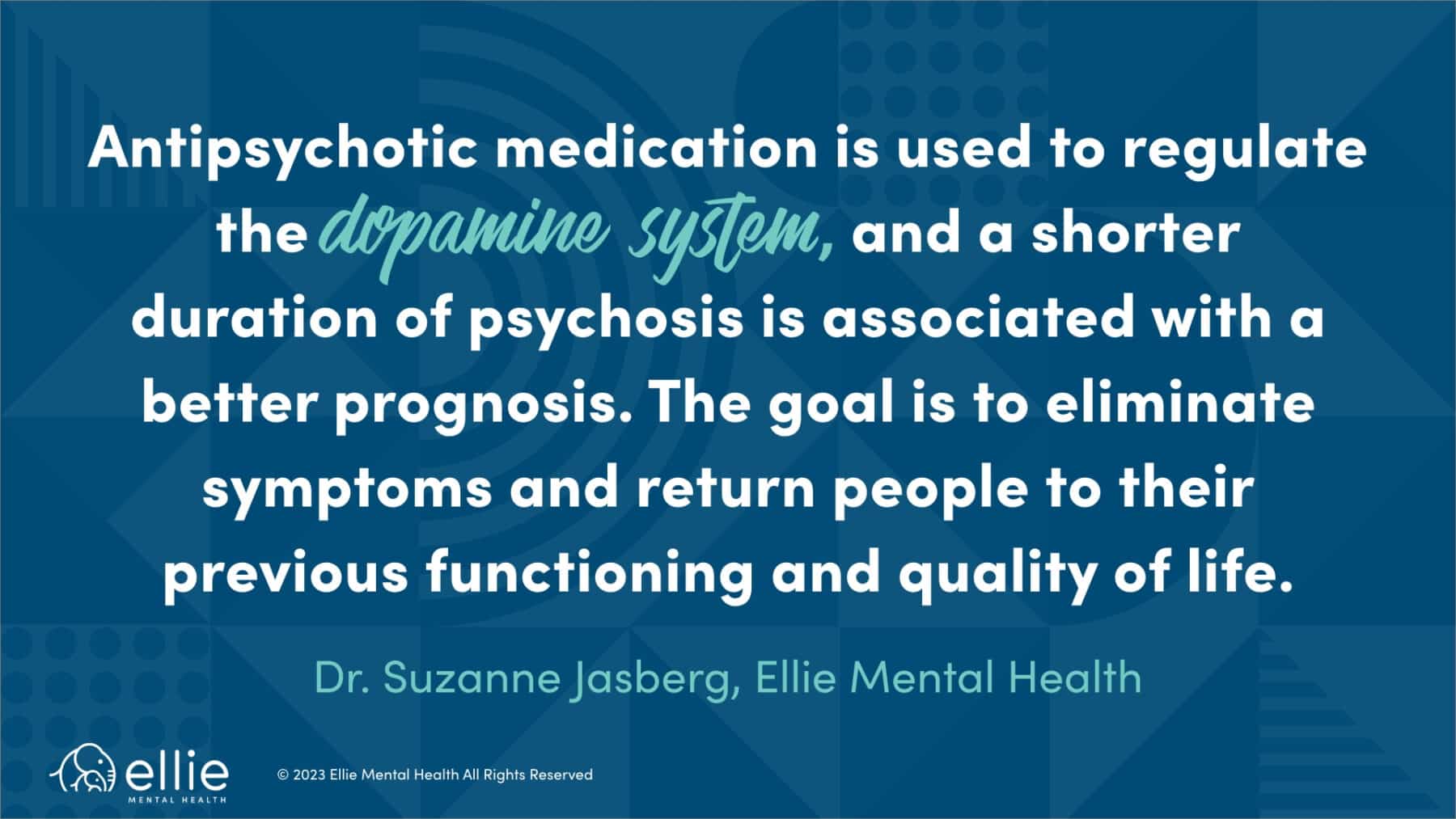Antipsychotic medications, sometimes called neuroleptics, are prescription drugs used to manage psychosis spurred by mental health conditions like treatment-resistant schizophrenia, bipolar disorder, and certain types of depression.
When paired with a strong support system and mental health therapies, these medications can do a world of good for you or a loved one in need. But with any psychotropic prescription drug (meaning one that alters your mental state,) there are some undeniably important considerations to understand and discuss with your mental health care providers.
In this article, we’ll get you up to speed on the basics of antipsychotic medications, how they work, potential challenges associated with them, and more. We encourage you to speak with a psychiatrist for more details and to address all your options.
Do you need more information on antipsychotic medications? Reach out to Ellie Mental Health today to learn more.
Types of Antipsychotic Medications

While all antipsychotic medications aim to ease psychosis and closely-related symptoms, they go about doing it in slightly different ways. This has created sort of a dividing line among antipsychotic medications, with options falling into one of two groups–typical antipsychotics and atypical antipsychotics.
● Typical antipsychotics — sometimes called first-generation antipsychotics, these were the first medications used to treat bipolar disorder and generally function by blocking dopamine receptors in the brain. This category of antipsychotic medication includes haloperidol, chlorpromazine, and fluphenazine.
● Atypical antipsychotics represent second-generation antipsychotics that came to market in the 1990s. These medications also block dopamine receptors but have a more complex mechanism of action that also allows for the blocking/regulation of serotonin. This results in controlling a broader range of psychosis-related symptoms, and this dopamine blockade also significantly minimizes the impact of the medications’ effect on muscle stiffness and movement. Common examples of atypical antipsychotics include clozapine, risperidone, olanzapine, quetiapine, ziprasidone, and aripiprazole.
While atypical antipsychotic medications are more commonly prescribed today, typical antipsychotics are still used as a viable treatment option in some cases.
How Do Antipsychotic Medications Work?
As mentioned above, the mechanism for these medications is based on limiting the flow of neurotransmitters (dopamine and serotonin) to the brain. Neurotransmitters are essentially messengers to our brain, and some believe psychotic episodes are caused by an overproduction of dopamine. By limiting the “messages” received, our brains can better regulate and manage these inputs.
Talk therapy can also be coupled with antipsychotic medications to yield good results for patients. Ellie’s Senior Director of Adult Psychiatry, Dr. Suzanne Jasberg, MD, puts it this way: “Therapy is absolutely helpful for people experiencing psychotic symptoms. Multiple modalities are used (from CBTs to supportive therapy, motivational interviewing, and IOPs, to name a few). The old dogma that psychosis patients cannot participate in therapy is absolutely false.”
What are Some of the Pros and Cons of Antipsychotic Medications?
First and foremost, the biggest benefit to a regimen of antipsychotic drugs is the ability to get severe mental illness symptoms of psychosis in check. While it may take some fine-tuning with your healthcare provider to find the ideal dosage and medication for keeping symptoms manageable, the benefits of having a stable baseline are hard to overstate.
“Medication is used to regulate the dopamine system, and a shorter duration of psychosis is associated with a better prognosis. The goal is to eliminate symptoms and return people to their previous functioning and quality of life,” says Jasberg.
It’s important to note that, as with any medication, antipsychotics can come with some side effects. At Ellie, our doctors very carefully monitor the side effects of the medication. We take side effects very seriously and work with patients to maximize patients’ quality of life on a medication. We encourage you to be open and honest with your doctor about your concerns about side effects so they can use the information to make a treatment plan that works for you.
Considerations for Children and Antipsychotic Medications
The decision to prescribe antipsychotics in a child’s treatment is a complex and often challenging situation for parents. One of the most common indications for the use of antipsychotic medications in children and adolescents is for agitation or aggression associated with autism, however, this is not the only use. It’s important to discuss this option thoroughly and honestly with their healthcare provider.
Another factor to be aware of is that, depending on the child’s age and specific diagnoses, not all antipsychotic medications may be FDA-approved and available. Medications are not studied as robustly in children as compared to adults and therefore fewer carry FDA indications. Your provider may recommend medications that are not FDA-approved but are still routinely and safely used in children with appropriate monitoring.
As in adults, there are potential side effects of these medications for children. For example, weight gain and menstrual irregularities are fairly common and can be particularly challenging for kids undergoing puberty to contend with. We encourage you to speak with your doctor about the options for your child.
How Long Does it Take for Antipsychotic Medications to Work?
Another important consideration with antipsychotic medications is the length of time it takes for patients to see results. While it’d be great to have a sustainable option that’s fully effective in minutes, the reality is most antipsychotics will require weeks or longer to reach their full effectiveness. More acute symptoms may see relief in a few days, but ultimately antipsychotic medications are a long-term effort.
How Long Do You Need to Be on Antipsychotic Medication?
There’s no universal answer to this question, as there are far too many variables from person to person. Your doctor will work with you to create an individualized plan as to how and when to reduce and even eliminate the need for medication.
Dr. Jasberg says, “The goal is to, overtime, reduce and possibly eliminate the medication. The likelihood of a patient being able to taper off of the medication is tied to their consistency in taking the medication early on in their symptom presentation.”
Can I Change Antipsychotic Medications if One isn’t Working?
The short answer is “yes, absolutely.” If your medication isn’t working, you should communicate the details with your doctor so that they can make changes to improve your experience. The more details your doctor has, the better they will be able to tailor your treatment plan to your needs. Depending on which medicines you are changing, your plan will be individualized based on a variety of factors. The goal is to treat and eliminate symptoms as quickly as possible.
Changing antipsychotic medications is a deliberate, individualized process that will need to be overseen by your healthcare provider to avoid triggering a relapse in psychosis symptoms.
Getting on Solid Ground
Psychosis symptoms are a challenging fact of life for many with serious mental health issues like schizophrenia and bipolar disorder, and conditions that may cause acute psychosis. Fortunately, these symptoms can be managed well with medication, and therapy can lead to meaningful progress.
We encourage you to speak with a psychiatrist sooner rather than later to get you or your loved one back on track to an optimal quality of life! Here at Ellie, we have immediate appointments available for medication management! Connect with a provider.


